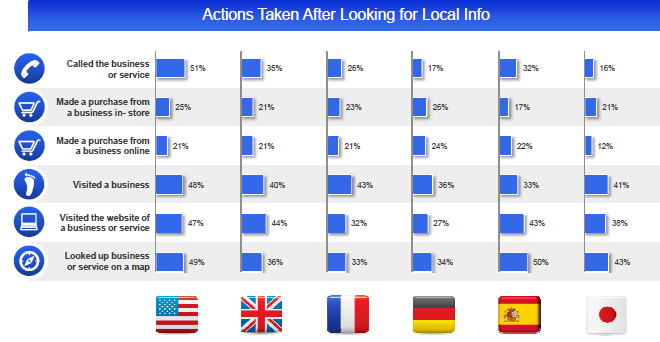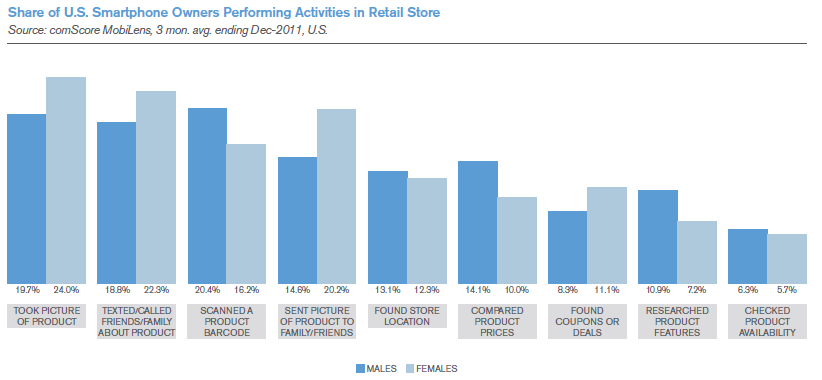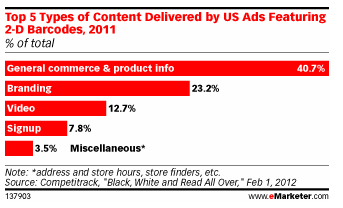 Interestingly, around 85% of smartphone owners seek local information and 1 in 5 make a purchase after finding that information. What does surprise us is that at least half of mobile shoppers make purchases monthly on their smartphones.
Interestingly, around 85% of smartphone owners seek local information and 1 in 5 make a purchase after finding that information. What does surprise us is that at least half of mobile shoppers make purchases monthly on their smartphones.
 So what about QR codes? Our trend report gives some clues on their adoption, but comScore's study “2012 Mobile Future in Focus” (Feb 2012) complements our research nicely. The report examines the mobile landscape across the United States, United Kingdom, France, Germany, Italy, Spain, Japan, and Canada. In total, 24 thousand respondents took part to the research.
It appears that when in a retail environment, almost 20% of US smartphone users have scanned a product barcode. This is roughly the same number of people who take pictures of products or call/text a friend about them.
So what about QR codes? Our trend report gives some clues on their adoption, but comScore's study “2012 Mobile Future in Focus” (Feb 2012) complements our research nicely. The report examines the mobile landscape across the United States, United Kingdom, France, Germany, Italy, Spain, Japan, and Canada. In total, 24 thousand respondents took part to the research.
It appears that when in a retail environment, almost 20% of US smartphone users have scanned a product barcode. This is roughly the same number of people who take pictures of products or call/text a friend about them.
 Furthermore, 73% did so to find product information, 32% to uncover a coupon or offer and 25% did so to find event information.
The above is in stark contrast with what the users actually receive when they scan a code. According to a third piece of research from eMarketer, "Mobile Barcodes Drive Traffic to Brand Sites from Print" (March 2012), 40.7% of the codes in US advertisements linked to product information, a brand’s site or a purchase opportunity. However, only 7.8% of the codes led to opt-ins for newsletters or contests, and fewer than 1% led to special offers, coupons, etc.
Furthermore, 73% did so to find product information, 32% to uncover a coupon or offer and 25% did so to find event information.
The above is in stark contrast with what the users actually receive when they scan a code. According to a third piece of research from eMarketer, "Mobile Barcodes Drive Traffic to Brand Sites from Print" (March 2012), 40.7% of the codes in US advertisements linked to product information, a brand’s site or a purchase opportunity. However, only 7.8% of the codes led to opt-ins for newsletters or contests, and fewer than 1% led to special offers, coupons, etc.
 Conclusion
Engaging consumers through their mobile device is about context (location, time) and action: "visit this shop next door"; "join the music event that starts in 30 min"; "scan this flyer and get an instant discount in this shop"; etc. All the ingredients to make it happen (mobile internet and devices, QR codes, consumer awareness of QR codes) are in place - marketers just need to grab the opportunity!
Conclusion
Engaging consumers through their mobile device is about context (location, time) and action: "visit this shop next door"; "join the music event that starts in 30 min"; "scan this flyer and get an instant discount in this shop"; etc. All the ingredients to make it happen (mobile internet and devices, QR codes, consumer awareness of QR codes) are in place - marketers just need to grab the opportunity!
Kezzler Expands Industry Leadership with Acquisition of Scanbuy
Neutronian Announces That Scanbuy Has Earned Its Data Quality Certification